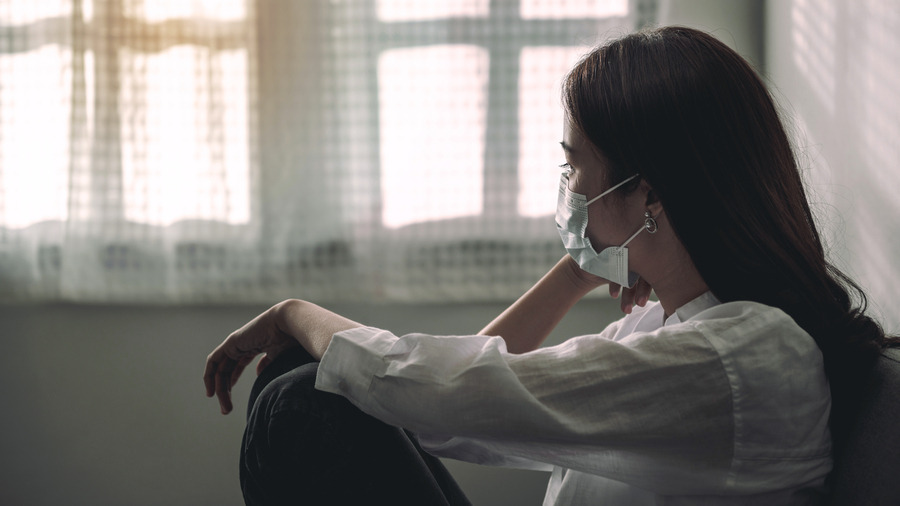Covid-19 poses significant long-term effects on individual health. More than 25 per cent of those with the disease do not completely recover even after six to eight months of initial infection, says a study published on July 12 in a renowned journal, PLOS One.
These patients suffer longer-term consequences of the disease, medically known as Long Covid.
The US Centers for Disease Control and Prevention (CDC) says that Long Covid or post-Covid conditions include a range of new, returning or ongoing health problems that individuals can suffer four or more weeks after the initial infection by SARS-CoV-2, the virus that causes Covid-19.
However, as the study in PLOS One points out, Long Covid refers to the physical and mental health consequences of SARS-CoV-2 infection that persist for more than three months after the initial infection.
According to Dr Sushmita Roy Chowdhury, director of pulmonology at Fortis Hospital in Kolkata, Long Covid syndrome is best described as “bothersome symptoms” persisting beyond four weeks of acute Covid illness.
Common symptoms of Long Covid include easy fatiguability, aches and pains, inability to concentrate or “brain fog”, palpitations and more specifically breathlessness on exertion and cough.

Common symptoms of Long Covid include easy fatiguability, aches and pains, inability to concentrate, palpitations and more specifically breathlessness on exertion and cough

Long Covid is seen more commonly with advancing age and among women. A slightly higher prevalence is also noted with obesity and in those with asthma, but it may affect people randomly
Dr Sushmita Roy Chowdhury, Fortis Hospital, Kolkata
Zurich to New Delhi
Long Covid may be a serious threat to the healthcare systems of various countries. For instance, UK’s Office for Nodal Statistics has said that nearly 400,000 people in the country reported the features of Long Covid for at least a year from their initial diagnosis of Covid-19.
The study in PLOS One looked at 431 adults in the Canton of Zurich — the most populous canton in Switzerland — who tested positive for Covid-19 during February 27 to August 5, 2020. Even at six to eight months after the initial diagnosis of the infection, 111 (26 per cent) of those 431 individuals reported that they had not fully recovered from the disease.
In India, it may be difficult to find out the exact burden of Long Covid cases, but according to a study posted on June 28 this year at the preprint server medRxiv by researchers led by Sandeep Budhiraja, director of the Max Super Speciality Hospital, New Delhi, Long Covid was found in 40 per cent (399 patients) of the 990 Covid-19 patients they looked at in their study. The patients got admitted at three hospitals in north India during April to August 2020.
What causes Long Covid
What causes Long Covid is unclear as of now, however, as Roy Chowdhury points out, it may be due to a “badly shaken immune system” long after the virus causing Covid-19 leaves the human body, and it may continue to affect the normal functioning of various organs.
According to the study in PLOS One, those who did not completely recover from Covid-19 at six to eight months after the initial diagnosis of the disease were over three times more likely to have further healthcare contacts (i.e. requirements), compared to the recovered individuals, and these results highlight the substantial long-term effects of Covid-19 on the affected individuals as well as the healthcare systems across the world.
How to treat Long Covid
Dr Anish Ray, consultant paediatrician at the Cook Children's Medical Center, Texas, US, noted that there is no established treatment to counter Long Covid. “But, we anticipate that with more and more people becoming vaccinated, Covid infection rates will drop and that in turn may help prevent Long Covid symptoms,” he added.
To recognise and treat Long Covid, a multidisciplinary approach is needed in most cases, involving a respiratory physician, cardiologist, psychologist and a physical rehabilitation team, said Roy Chowdhury.
She recommended taking up appropriate early intervention to tackle the condition as it may help the affected person regain full functionality early and avoid pressure on the health services.
“Eating healthy, doing breathing exercises, walking 30 minutes a day, avoiding alcohol intake and staying positive are some non-interventional ways to beat post-Covid blues,” she said.
Dr Sanjeet Bagcchi is a physician and independent medical writer
